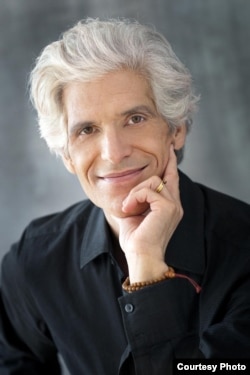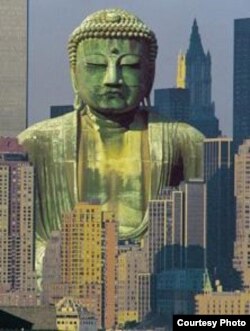NEW YORK – The recorded sounds of chanting Tibetan monks many worlds away might seem out of place in a Manhattan psychiatrist’s waiting room, but this is also the headquarters of the Nalanda Institute for Contemplative Science.
Its director and founder, psychiatrist Joseph Loizzo, also holds a doctorate in religion and Buddhist studies. His new book, “Sustainable Happiness,” details his decades of research and clinical practice combining traditional psychoanalysis, cutting edge neuroscience and Buddhism into a seamless whole.
“The main problem in our human condition has to do with the fact that our natures were adapted for life in the wild, and that because of civilization, we are living in very unnatural conditions,” says Loizzo, who believes this is the primary source of stress for most people. "The stress instincts are what prepare us to fight or fly or freeze sometimes in dangerous situations. But since civilization began to sort of take over our whole lives, these stress reactions are a less and less useful part of our makeup.”
However, it’s difficult to control our reactions to stressful situations, such as when your supervisor at work tells you to produce something on a deadline you feel unable to meet. The shortness of breath, the sweaty palms, the adrenaline surge, the sense of wariness and unease come unbidden.
According to Loizzo, that’s because your nervous system instinctively bypasses your rational mind when your boss seems to be posing a threat to your well-being.
“And because really what is challenging us is not a predator, but is another human being," he says, "whom we need to cooperate with and we need to negotiate with, essentially we become maladapted.”
Over time, that stress can lead to depression, chronic anxiety, hypertension, and heart disease. Loizzo says this is why he has incorporated meditation and other Buddhist techniques into his medical practice. Focusing on one’s breath and learning to simply watch as thoughts, feelings and sensations arise and pass away not only relieves stress. The technique can actually re-train the brain.
“The idea is that if you’re mindful, you are able to assess things more clearly, and you are able to catch the misperceptions and over-reactions as they occur and opt out of them and choose the alternative [and] to see what is happening to you. Meditation becomes sort of a teachable simple pragmatic system for strengthening the parts of our mind and our brain that we need to be healthy and happy.”
But Loizzo says that Buddhist-based psychotherapy is more than meditation. Like classic psychoanalysis, it involves a deep and committed search for the meaning of one’s life through personal storytelling.
“That’s the way our minds work. Our minds produce stories and images and things. And so some of the skills we teach have to do with learning to tell ourselves more constructive stories that empower us and help us to build the life that we really want to live - not the one we are trying to survive, or are afraid of being stuck in forever.”
Such methods have been life-changing for many of Loizzo’s patients.
“Depression was a major problem for me," says one patient. "And through Joe’s support and our interaction I’ve been able to connect myself with other people and develop a network of people who support me in more meaningful relationships, things like that. It’s been a revolution in my life the way I think about myself and think about the world. I feel like I still have a long way to go but I’ve come a long way.”
Mindfulness techniques have been effective in other settings. For example, breast cancer patients whose disease has gone into remission often report PTSD-like symptoms long after treatment ends. Western medicine offers little to ease the continued fear and anxiety.
For a pilot study, Loizzo taught 60 women in a 20 week course that included meditation instruction and group discussions. Afterwards, most reported feeling less anxious and more hopeful about their lives. Dr. Mary Charson, Loizzo’s colleague at Cornell Weill Medical College’s Center for Integrative Medicine, was impressed with the results.
“The reality is - if you look at the data, both the quantitative data and the qualitative data - people had a sense that it gave them their life back," she says. "Apart from curing and treating the disease, it’s important that we improve people’s quality of life.”
And that is the “sustainable happiness” Loizzo seeks to achieve by melding Western psychotherapy and Eastern spirituality.
Its director and founder, psychiatrist Joseph Loizzo, also holds a doctorate in religion and Buddhist studies. His new book, “Sustainable Happiness,” details his decades of research and clinical practice combining traditional psychoanalysis, cutting edge neuroscience and Buddhism into a seamless whole.
“The main problem in our human condition has to do with the fact that our natures were adapted for life in the wild, and that because of civilization, we are living in very unnatural conditions,” says Loizzo, who believes this is the primary source of stress for most people. "The stress instincts are what prepare us to fight or fly or freeze sometimes in dangerous situations. But since civilization began to sort of take over our whole lives, these stress reactions are a less and less useful part of our makeup.”
However, it’s difficult to control our reactions to stressful situations, such as when your supervisor at work tells you to produce something on a deadline you feel unable to meet. The shortness of breath, the sweaty palms, the adrenaline surge, the sense of wariness and unease come unbidden.
According to Loizzo, that’s because your nervous system instinctively bypasses your rational mind when your boss seems to be posing a threat to your well-being.
“And because really what is challenging us is not a predator, but is another human being," he says, "whom we need to cooperate with and we need to negotiate with, essentially we become maladapted.”
Over time, that stress can lead to depression, chronic anxiety, hypertension, and heart disease. Loizzo says this is why he has incorporated meditation and other Buddhist techniques into his medical practice. Focusing on one’s breath and learning to simply watch as thoughts, feelings and sensations arise and pass away not only relieves stress. The technique can actually re-train the brain.
“The idea is that if you’re mindful, you are able to assess things more clearly, and you are able to catch the misperceptions and over-reactions as they occur and opt out of them and choose the alternative [and] to see what is happening to you. Meditation becomes sort of a teachable simple pragmatic system for strengthening the parts of our mind and our brain that we need to be healthy and happy.”
But Loizzo says that Buddhist-based psychotherapy is more than meditation. Like classic psychoanalysis, it involves a deep and committed search for the meaning of one’s life through personal storytelling.
“That’s the way our minds work. Our minds produce stories and images and things. And so some of the skills we teach have to do with learning to tell ourselves more constructive stories that empower us and help us to build the life that we really want to live - not the one we are trying to survive, or are afraid of being stuck in forever.”
Such methods have been life-changing for many of Loizzo’s patients.
“Depression was a major problem for me," says one patient. "And through Joe’s support and our interaction I’ve been able to connect myself with other people and develop a network of people who support me in more meaningful relationships, things like that. It’s been a revolution in my life the way I think about myself and think about the world. I feel like I still have a long way to go but I’ve come a long way.”
Mindfulness techniques have been effective in other settings. For example, breast cancer patients whose disease has gone into remission often report PTSD-like symptoms long after treatment ends. Western medicine offers little to ease the continued fear and anxiety.
For a pilot study, Loizzo taught 60 women in a 20 week course that included meditation instruction and group discussions. Afterwards, most reported feeling less anxious and more hopeful about their lives. Dr. Mary Charson, Loizzo’s colleague at Cornell Weill Medical College’s Center for Integrative Medicine, was impressed with the results.
“The reality is - if you look at the data, both the quantitative data and the qualitative data - people had a sense that it gave them their life back," she says. "Apart from curing and treating the disease, it’s important that we improve people’s quality of life.”
And that is the “sustainable happiness” Loizzo seeks to achieve by melding Western psychotherapy and Eastern spirituality.









